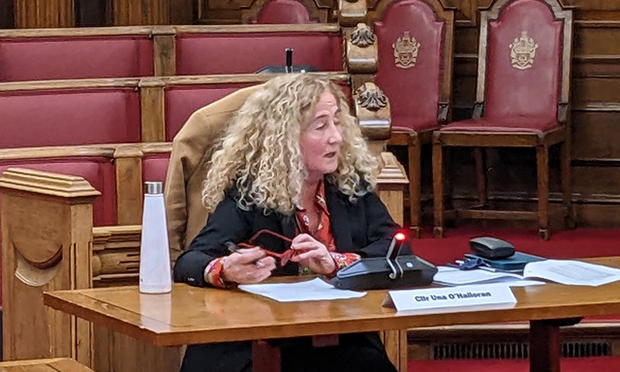Overcrowding is biggest issue within Islington’s social housing, council says

Housing chief Cllr Una O’Halloran. Photograph: Julia Gregory
Overcrowding is the greatest obstacle facing Islington’s council homes, the borough’s housing chief says, as the Town Hall takes steps to rehabilitate its stock following last year’s special investigation.
In September 2023, the Housing Ombudsman identified serious issues in the way the local authority was dealing with housing complaints, and found incidents of severe maladministration were ‘nearly four times the national average’.
Since then, the council has put together an action plan to address the problems, such as more staff training and changes to complaints monitoring.
The latest update was given to the Homes and Communities scrutiny committee on Monday.
Cllr Una O’Halloran, executive member for homes and neighbourhoods, thanked the committee for holding the executive to account over social housing maintenance.
She noted that while issues around damp in mould in council homes would not be solved overnight, “we have it mapped out and will make sure cases are going down”.
She said overcrowding as a result of poor supply was the biggest obstacle in improving the council’s services overall.
Jed Young, corporate director of homes and neighbourhoods, also raised the £1.8 billion investment gap as a significant challenge to housing stock upkeep.
“We’re not spending enough on capital works, which means we’re spending more on maintenance,” he said.
Resident observer Dean Donaghey asked Young if he expects damp and mould to worsen if pensioners choose not to heat their homes following a new government policy that could strip them of winter fuel payments.
Young said the council’s Household Support Fund was being promoted to occupants struggling with fuel poverty “regardless of age”.
He also said there was a possibility of giving people smart sensors in their homes to help them keep better track of heat, humidity and damp levels.
The council also continues to promote the SHINE fuel poverty referral network, which gives advice around improving efficient energy use.
In September 2023, the Ombudsman delivered a special report on the Town Hall’s housing services, identifying underlying issues including a ‘disjointed’ approach to complaints and a ‘lack of clear ownership’ of problems.
The watchdog upheld at least one aspect of each resident’s complaint, and in almost half of cases found “severe maladministration”.
It said: “The landlord has a severe maladministration rate of 24.7 per cent, which is nearly four times the national average of 6.7 per cent.
“Among the cases was a disabled resident unable to use their ground floor wet room for months due to a lack of repairs, while another resident’s complaint was stuck in the landlord’s system for three years.
“Another complaint saw a resident with mental health problems stuck without a working key fob for her building for 10 months – something that should have been resolved within 24 hours.”
The Town Hall has so far taken several measures in response to the damning investigation, including a restructuring of the complaints team, staff training from the Ombudsman, and meetings with contractors to avoid delays and to make sure they follow up with residents.
Following the investigation last September, the council stated it had brought on more staff where needed and increased “preventative investment” around damp, mould and leaks.
